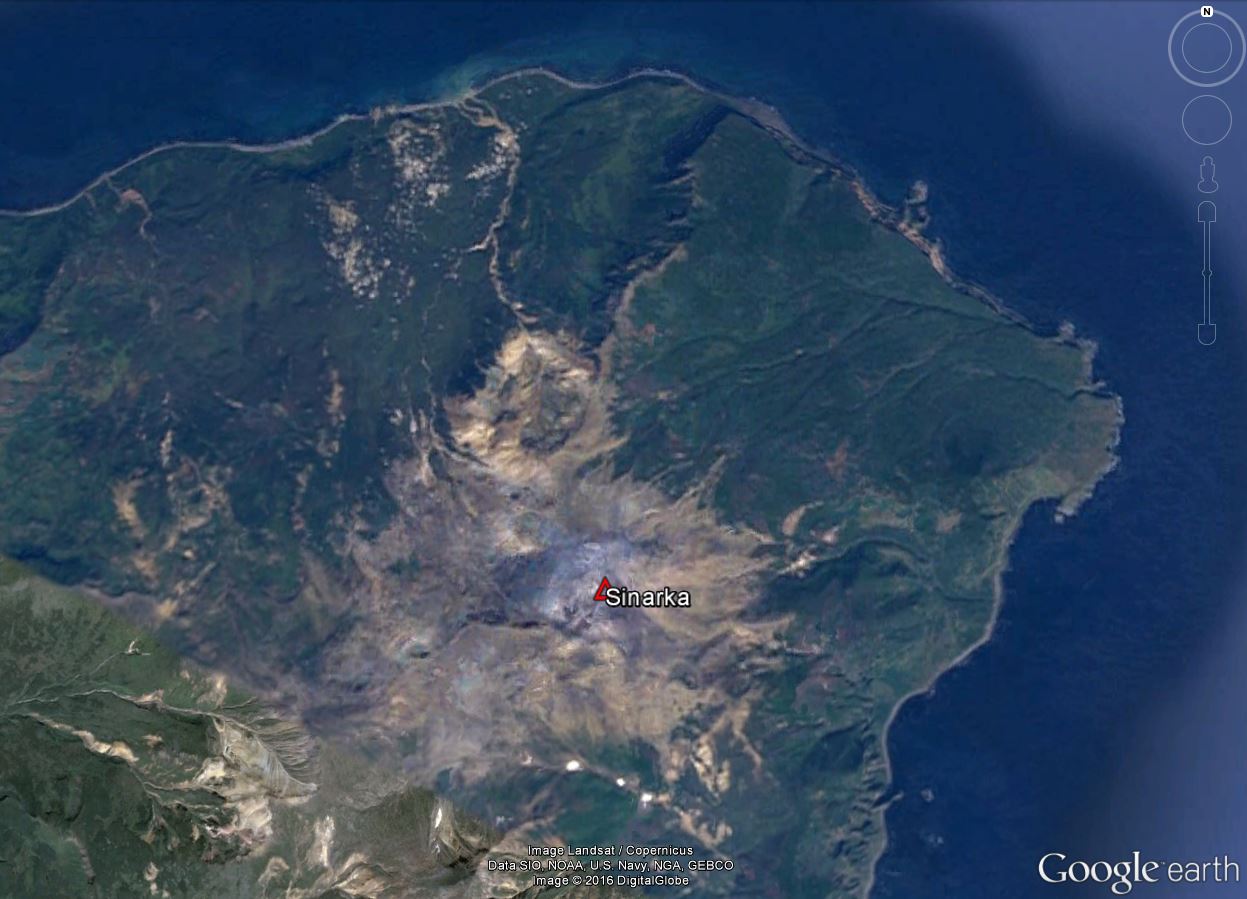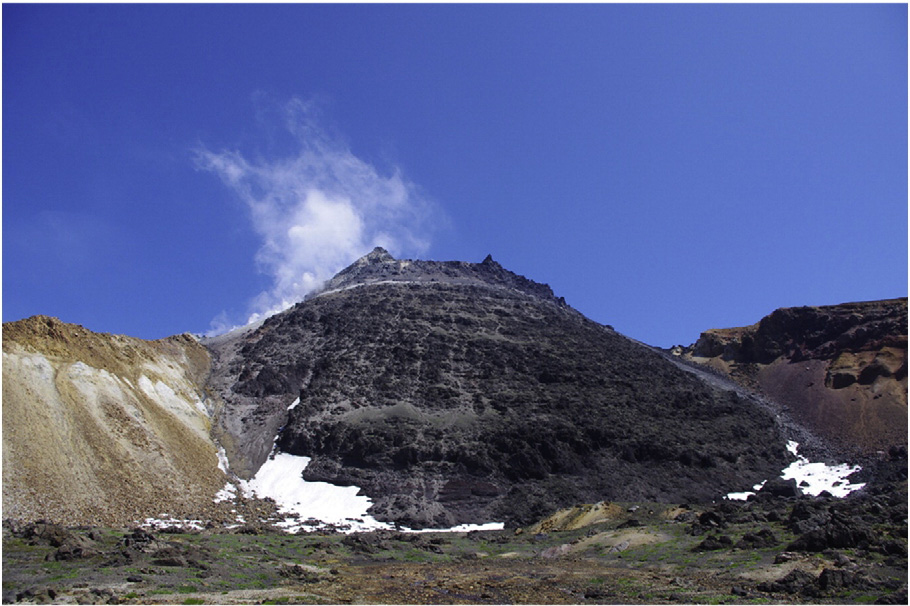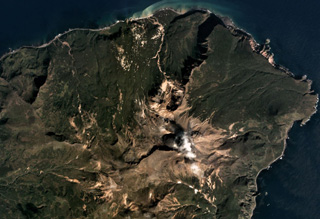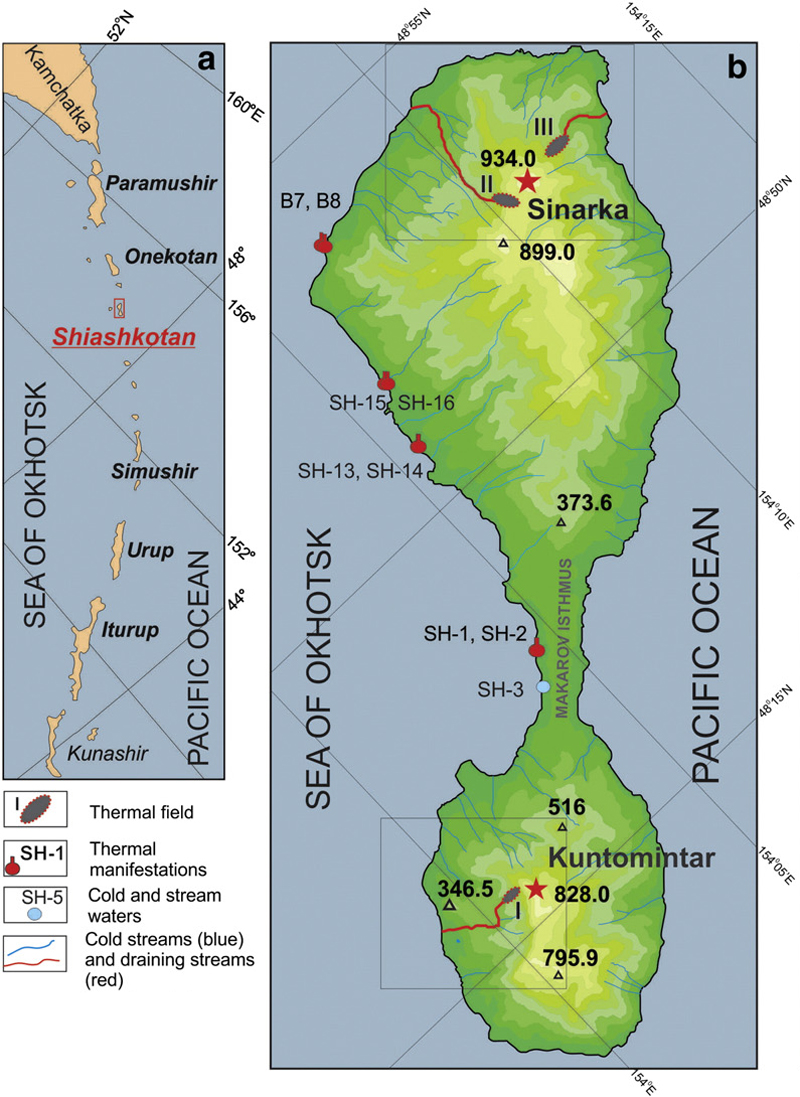Report on Sinarka (Russia) — June 2016
Bulletin of the Global Volcanism Network, vol. 41, no. 6 (June 2016)
Managing Editor: Edward Venzke.
Research and preparation by Robert Andrews.
Sinarka (Russia) Stronger thermal activity during November 2014-March 2015; possible minor ash emission
Please cite this report as:
Global Volcanism Program, 2016. Report on Sinarka (Russia) (Venzke, E., ed.). Bulletin of the Global Volcanism Network, 41:6. Smithsonian Institution. https://doi.org/10.5479/si.GVP.BGVN201606-290290
Sinarka
Russia
48.873°N, 154.182°E; summit elev. 911 m
All times are local (unless otherwise noted)
The hydrothermally-active Sinarka volcano (figure 1) is located on the NE end of the dumbbell-shaped island of Shiashkotan, in the Kuril Islands chain, with Kuntomintar in the south (figure 2). Kalacheva et al. (2015) note that the extrusive dome within the central cone exhibits degassing through strong and hot (over 400°C) fumaroles (figure 3). Much of the time the volcano is obscured by clouds from satellite observations, but it is monitored by the Sakhalin Volcanic Eruption Response Team (SVERT).
 |
Figure 1. Landsat / Copernicus satellite image showing Sinarka volcano at the NE end of Shiashkotan Island. Courtesy of Google Earth. |
 |
Figure 3. Photo of the lava dome within the central cone of Sinarka. From Kalacheva et al. (2015); photo by Elena Kalacheva. |
The Sakhalin Volcanic Eruption Response Team (SVERT) noted volcanic activity at Sinarka between 11 November 2014 and 21 March 2015 (table 1). The primary observations were of a weak thermal anomaly combined with weak steam-and-gas plumes seen in satellite imagery. Plumes sometimes drifted as far as 40-50 km downwind. The cause of the anomalies is unknown. However, on 3 December 2014 the plume reportedly contained minor ash.
Table 1. Summary of activity observed at Sinarka volcano from November 2014 to June 2016. Courtesy of Sakhalin Volcanic Eruption Response Team (SVERT).
| Date | Activity | Aviation Color Code |
| 11 Nov 2014 | Weak steam/gas plume drifting 40 km E. | Yellow |
| 12 Nov 2014 | Strengthening steam/gas plume drifting NE; weak thermal anomaly. | Yellow |
| 16 Nov 2014 | Weak thermal anomaly. | Yellow |
| 19 Nov 2014 | Weak steam/gas plume. | Yellow |
| 27 Nov 2014 | Steam/gas plume drifting 50 km SE. | Yellow |
| 03 Dec 2014 | Minor ash with steam/gas plume drifting 40 km NE. | Yellow |
| 06 Dec 2014 | Weak steam/gas plume. | Yellow |
| 08 Dec 2014 | Weak steam/gas plume. | Yellow |
| 05 Jan 2015 | Steam/gas plume to 3 km drifting SE. | Yellow |
| 26 Jan 2015 | No activity detected in January. | Green |
| 16 Mar 2015 | Weak steam/gas plume. | Green |
| 21 Mar 2015 | Weak thermal anomaly. | Green |
Reference: Kalacheva, E., Taran, Y., and Kotenko, T., 2015, Geochemistry and solute fluxes of volcano-hydrothermal systems of Shiashkotan, Kuril Islands. Journal of Volcanology and Geothermal Research, v. 296, p. 40-54.
Geological Summary. Sinarka volcano, occupying the northern end of Shiashkotan Island in the central Kuriles, has a complex structure. A small, 2-km-wide depression open to the NW has been largely filled and overtopped by an andesitic postglacial central cone that itself contains a lava dome that forms the high point of the island. Another lava dome, Zheltokamennaya Mountain, lies 1.5 km to the SW along the buried SW rim of the caldera, and a smaller dome lies along the northern caldera rim. Historical eruptions have occurred during the 17th and 18th centuries. The last and largest of these, during 1872-78, was once thought to originate from Kuntomintar volcano at the southern end of the island, but is now attributed to Sinarka (Gorshkov, 1970).
Information Contacts: Sakhalin Volcanic Eruption Response Team (SVERT), Institute of Marine Geology and Geophysics, Far Eastern Branch, Russian Academy of Science, Nauki st., 1B, Yuzhno-Sakhalinsk, Russia, 693022 (URL: http://www.imgg.ru/en/, http://www.imgg.ru/ru/svert/reports).


